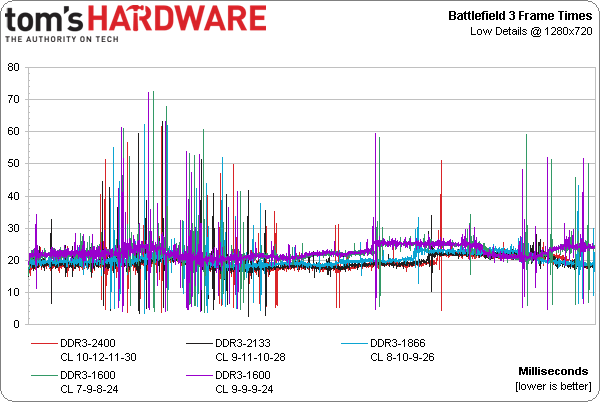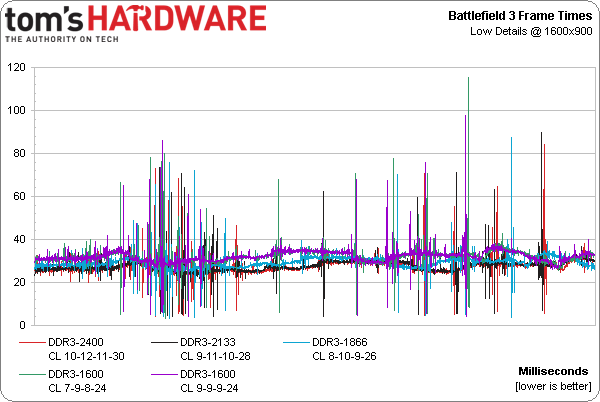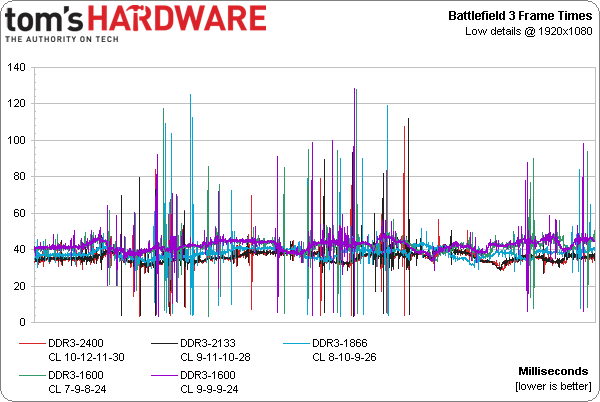Memory Scaling, AMD's Trinity APUs, And Game Performance
When it comes to gaming, the integrated Radeon on AMD's Trinity architecture crushes the HD Graphics 4000 engine native to Intel's fastest Ivy Bridge CPU. But we want to make a good thing better. How much does fast memory help boost an APU's performance?
Battlefield 3, Frame By Frame
Long frame times are most jarring to me when there's a lot of on-screen movement. While slowing down usually helps mask this phenomenon somewhat, that's not really a viable workaround in first-person shooters and racing games.
We've established that it's difficult to record evidence of this phenomenon in multi-card configurations. But Fraps does make this possible in single-GPU systems. We're using it today to record performance in Battlefield 3.
It's difficult to generalize, but many folks can tolerate a 20 FPS minimum. So, we set an upper limit of 50 ms per frame to assure reasonable fluidity. Beyond that, adding time per frame can be a much more intrusive distraction.
The sad fact is that even with an average of 50 FPS (shown on the previous page), our fastest memory configuration can't reliably keep the A10-5800K's on-board graphics processor under 50 ms per frame.
Of course, maximum rendering times get worse as resolution increases. Memory latency could be an issue, but even pricey low-latency kits are barely better than the DDR3-1600 CAS 7 config we tested, or this setup's DDR3-2133 CAS 9 arrangement.
Get Tom's Hardware's best news and in-depth reviews, straight to your inbox.
Current page: Battlefield 3, Frame By Frame
Prev Page Results: Battlefield 3 And F1 2012 Next Page Results: Skyrim And StarCraft II-
Wisecracker Thanks.Reply
The question is ... does the performance with higher speed memory continue to scale as the *SIMD Engine Array* is over-clocked.
Inquiring minds would like to know ...
-
Onus ReplyAnd there were a few games where the faster memory was required simply to break us into our minimally-accepted 40 FPS average.
Right there. An APU is not a top-tier gamer, so incremental improvement really matters. I could not care less about going from 60FPS to 80FPS, but 30FPS to 40FPS, the same relative improvement, is a really big deal. -
slomo4sho slomo4shoI would really like to see some 5760x1080 benchmarks.Reply
Individuals who would use faster memory for gaming are likely to want to push their mid/high range card to the limits, do you plan on doing a similar piece for AMD CPUs as you did in the Intel article "Does Memory Performance Bottleneck Your Games?"
Also, I would like to see a Nvidia card at play as well. Maybe a 650 Ti or 660 Ti? In addition, it wold be nice to see the memory scaling difference between AMD and Nvidia GPUs in a single review.
Thanks. -
merikafyeah esreverCan't wait to see what DDR4 can do for APUs.Considering how DDR3-2400 is only a tiny fraction better than DDR3-2133, it's safe to assume memory stops being the bottleneck around that point. DDR4 will not noticeably improve performance or even power consumption as memory consumes almost negligible amounts of electricity to begin with.Reply
It's back to looking at better GPUs and CPUs for better performance.
Bpttleneck hierarchy has always been GPU>CPU>RAM.
The CPU has always been more reliant on the RAM than the GPU but an APU is basically a GPU+CPU in one, so RAM is more important, but as we've seen, only up to DDR3-2133. After that diminishing returns skyrocket. -
jubas slomo4shoAlso, I would like to see a Nvidia card at play as well. Maybe a 650 Ti or 660 Ti? In addition, it wold be nice to see the memory scaling difference between AMD and Nvidia GPUs in a single review.I didn't know that nVidia made APU's?Reply
The more you know... /rollseyes/ -
de5_Roy quite promising performance from trinity.Reply
still, 15 gb/s out of ddr3 2400 ram is just sad. i expect amd to improve in the next gen apus. the igpus deserve the extra memory bandwidth.
i wonder how cpu overclocking (along with igpu and ram oc) affect the games like skyrim, starcraft and f1. those seemed more memory sensitive.



